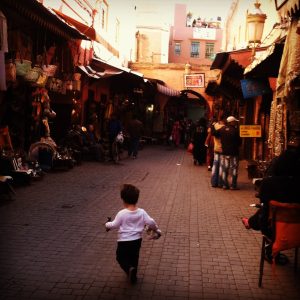
by Natalia Rankine-Galloway (Morocco) | Jul 17, 2013 | Body Image, Cultural Differences, Culture, Expat Life, Feminism, International, Life Lesson, Living Abroad, Morocco, Religion, Saudi Arabia, Sexuality, Travel, Uncategorized, World Motherhood
 Recently, my boobs took a trip to Jordan. At least it seemed at the time that the rest of me was just along for the ride. Never had my cleavage gotten so much attention; never had it occupied my thoughts so completely.
Recently, my boobs took a trip to Jordan. At least it seemed at the time that the rest of me was just along for the ride. Never had my cleavage gotten so much attention; never had it occupied my thoughts so completely.
Having lived in Morocco for almost a year, I thought I knew how to strike the proper balance….somewhere between my usual, US appropriate signature style and a more modest décolletage that I felt was an appropriate concession to my host country’s social norms.
This balance was clearly off-kilter for Jordan. My ensembles were getting more attention from the male Jordanian population than a Britney Spears get up. Given that I have been a little sensitive about my dwindling cup size since giving up nursing my son, I was momentarily flattered….before being sincerely uncomfortable and confused.
I knew in theory that one country in the Middle East or North Africa would not necessarily adhere to the same standards of dress for women as the next, just as various areas or social classes within Morocco dressed worlds apart.
(more…)
Natalia was born a stone's throw from the Queen's racetrack in Ascot, UK and has been trying to get a ticket to the races and a fabulous hat to go with it ever since. She was born to a Peruvian mother and an Irish father who kept her on her toes, moving her to Spain, Ireland and back to the UK before settling her in New York for the length of middle and high school. She is still uncertain of what she did to deserve that.
She fled to Boston for college and then Washington, D.C. to marry her wonderful husband, who she met in her freshman year at college. As a military man, he was able to keep her in the migratory lifestyle to which she had become accustomed. Within 5 months of marriage, they were off to Japan where they stayed for a wonderful 2 and one half years before coming home to roost. Baby Xavier was born in New York in 2011 and has not slept since.
A joy and an inspiration, it was Xavier who moved Natalia to entrepreneurship and the launch of CultureBaby. She has loved forging her own path and is excited for the next step for her family and CultureBaby.
Natalia believes in the potential for peace that all children carry within them and the importance of raising them as global citizens. She loves language, history, art and culture as well as Vietnamese Pho, Argentinian Malbec, English winters, Spanish summers and Japanese department stores...and she still hopes one day to catch the number 9 race with Queen Liz.
You can find her personal blog, The Culture Mum Chronicles.
More Posts
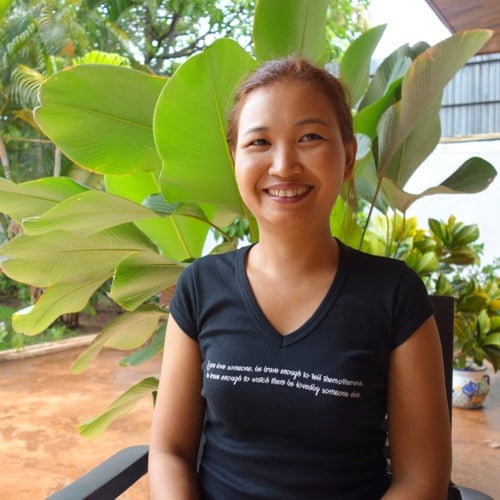
by Dee Harlow (Laos) | Jun 27, 2013 | 2013, Birthing, Culture, Eye on Culture, Inspirational, World Moms Blog, World Motherhood
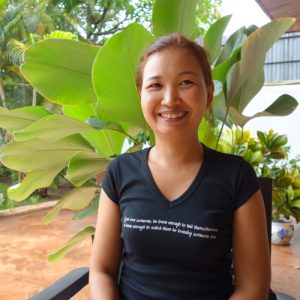
Our “Casting a Wider Net” series features mothers around the world whose voices have typically been excluded from the blogosphere, due to lack of access to the internet, low literacy or poverty. This feature aims to include their important and distinct perspectives with interviews and occasional video clips.
Peng is a soft spoken but opinionated housekeeper who is meticulous, professional and very kind. Like many of her peers, she switched careers to become a housekeeper because it pays more money. After finishing high school, her father paid for her to attend trade school to become a trained cook, after which she began working a stable but odd hours catering job in a big hotel here in the capital city of Vientiane. Despite her burgeoning restaurant career, after one year Peng’s father advised her to become the housekeeper of his then foreigner boss instead, not only because it paid more but offered more reasonable hours and a nice environment in a large, well appointed home. She hasn’t looked back on her restaurant career and still agrees today that being a housekeeper for foreigners pays more than restaurant work as an assistant cook, even in large establishments.
The only time Peng has stopped working was when she became a mother to her daughter, Cofie, and raised her at home for her first four years. Cofie was born in 2001, in a small hospital near Peng’s house on the outskirts of the city. Peng said that she chose this particular hospital to give birth because it was close by and not as crowded as the main government run Mahosot Hospital. And good thing that it was nearby her home because she was turned back twice within two days after her initial contraction pains started. (more…)
One of Dee’s earliest memories was flying on a trans-Pacific flight from her birthplace in Bangkok, Thailand, to the United States when she was six years old. Ever since then, it has always felt natural for her to criss-cross the globe. So after growing up in the northeast of the US, her life, her work and her curiosity have taken her to over 32 countries. And it was in the 30th country while serving in the Peace Corps in Uzbekistan that she met her husband. Together they embarked on a career in international humanitarian aid working in refugee camps in Darfur, Sudan, and the tsunami torn coast of Aceh, Indonesia.
Dee is now a full-time mother of three-year old twins and continues to criss-cross the globe every two years with her husband who is in the US Foreign Service. They currently live in Vientiane, Laos, and are loving it! You can read about their adventures at Wanderlustress.
More Posts

by Mama Mzungu (Kenya) | Jun 19, 2013 | Casting a Wider Net, Cultural Differences, Grandparent, Interviews, Life Balance, Motherhood, Parenting, Social Good, Traditions, Uncategorized, World Motherhood, World Voice
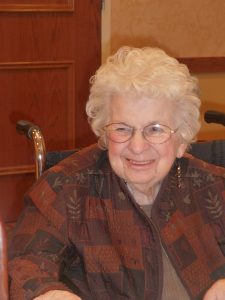
Our “Casting a Wider Net” series features mothers around the world whose voices have typically been excluded from the blogosphere, due to lack of access to the internet, low literacy or poverty. This feature aims to include their important and distinct perspectives with interviews and occasional video clips.
My grandmother, even at 91, never ceases to amaze me. She has fought back from accidents and illness, car wrecks and strokes, with unexpected strength and optimism, probably from a deep drive to feel fully engaged in the world. When my grandfather, the love of her life, widowed her over 30 years ago, she saw past her grief to discover new joys, taking up folk dancing and beginning a new career as a pre-school teacher. Today, her hands shake, the result of essential tremors, but that was beside the point when she decided to take up pottery – a unquestionably physical art form – in her 8th decade of life. Her brightly colored ceramic creations fill her small apartment and she makes gifts of them for her 5 grandchildren and growing brood of “greats.”
But it’s not just her zest that draws you in. She’s warm, the kind of woman it’s easy to open up to, a good listener and curious question-asker. It’s probably this quality, along with her undeniably sweet demeanor, that has kept her in companionship since my grandfather passed. And it’s this quality that made me want to turn the tables and ask her questions. (more…)
Originally from Chicago, Kim has dabbled in world travel through her 20s and is finally realizing her dream of living and working in Western Kenya with her husband and two small boys, Caleb and Emmet. She writes about tension of looking at what the family left in the US and feeling like they live a relatively simple life, and then looking at their neighbors and feeling embarrassed by their riches. She writes about clumsily navigating the inevitable cultural differences and learning every day that we share more than we don’t. Come visit her at Mama Mzungu.
More Posts - Website
Follow Me:


by Sarah Sensamaust | Jun 12, 2013 | Africa, Child Care, Childhood, Cultural Differences, Family, Home, Living Abroad, Motherhood, World Motherhood
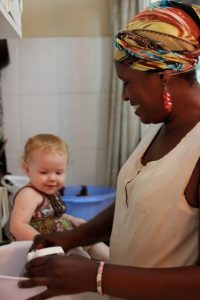
Look for Congo on any list ranking quality of life, poverty rate, violence per square meter, etc. and we don’t fare well. Great place to raise a kid, right?
Well, actually, for us, yes.
My friend Jill is my neighbor, co-worker and blogging partner on our blog Mama Congo. We raise our children, along with our husbands, in the Democratic Republic of Congo. What we lack in first world standards, we make up for in mamas. Our children call at least 6 women “mama.” Maybe more depending on the day.
In the Congo every woman is called “Mama So-and-So.” I’m Mama Sarah, she’s Mama Jill, and the women who come to our homes everyday and help us raise our children are Mama Youyou, Mamicho, Mama Vida and Mama Nounou. That’s a lot of mamas between our two households.
My husband Adam and I moved to the Congo five years ago and Jill and her husband Johan moved in next door a little while later. Our children all run around together getting bit by mosquitoes while we call for them to return to their respective houses. It’s a great life; made possible mostly by our mamas.
Jill and I are about to travel back to the States to visit our families for the summer. We’ll spend time with the grandparents, show off the new tricks our kids can do, and indulge in all the food we can’t find in Congo. But sometimes it’s hard to leave our little “village” of women raising our children with us.
Sure we’ll miss their help, but what we mostly miss is how totally fun and wacky and sometimes completely puzzling it is to raise your kids with a Congolese woman by your side. For example, sometimes we’ll find the mamas up in a tree throwing fruit down to our kids. They yell in French, “Look out below!” As star fruit or bunches of bananas rain down.
Every now and then from my office window I’ll see them toting our children on their backs when their little legs are too tired to walk home from the playground. Even the smallest baby cries, “Au dos. Au dos,” (on your back) when she wants to hitch a ride.
I know that if my daughter hasn’t eaten enough of her breakfast, I’ll get an earful when Mama Youyou shows up. She examines the size of her belly, determines it’s not properly filled, and then coaxes her into eating more. Next she reminds me I need to keep my kids nice and fat so that if they get sick they’ll be okay.
When the kids do inevitably get sick, the mamas are the biggest worriers. I get that. Where we’re from in the States, children get sick and then they get better. Here in Congo, that’s not a guarantee. So everyone hovers and shakes their heads and carries them au dos all day while rotating cold washcloths on their foreheads. It’s a major production. And the children love it.
Sometimes people ask us if it’s hard to share that title of “mama” with others. It isn’t. It really isn’t! We feel like the luckiest mamas because our children are being raised in such a different and loving way. Sure, it took some time for everyone to adjust and learn their place in the household, but we’ve all got into a rhythm now. I hold this end, you hold that end as we wrestle their filthy bodies in the tub.
I think every mother can agree that raising your children with a lot of help, mixed in with doses of advice, and sprinkled with good old fashioned judgment to keep you on your toes, is a great way to be a mama.
Do your children have other “mamas” where you live? Who are they, and how do they help you?
This is an original post written for World Moms Blog by Sarah. You can find Sarah blogging with Jill at Mama Congo.
Photo credit to the authors.
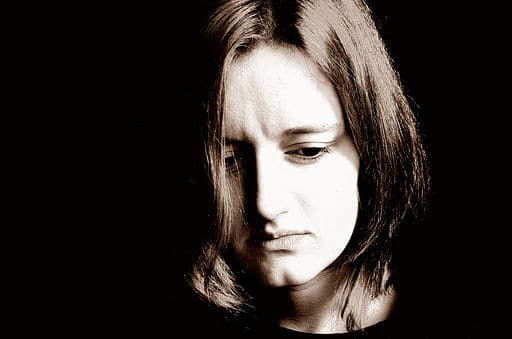
by Carol (Canada) | Jun 7, 2013 | Babies, Canada, Communication, Culture, Family, Health, Infertility, Kids, Loss of Child, Maternal Health, Miscarriage, Motherhood, Pregnancy, Relationships, Womanhood, Working Mother, World Motherhood, Younger Children

Recently, when I was around 10 weeks pregnant, I went in for a dating ultrasound.
My midwife wanted to confirm my baby’s due date, because we suspected that I was actually 9 weeks along, or maybe 11 weeks.
The radiologist discovered that my baby was dead – had died at 8 weeks and 4 days… whenever that had been.
We all know that miscarriage is always a risk, but it’s still a shock to go in for a routine ultrasound with a seemingly healthy pregnancy… and then leave in tears talking about getting a D&C.
A week later I was sedated and the remains of my baby were scooped out of me.
I was heartbroken. I was grieving.
But I was also very lucky: I had immense amounts of support.
I had friends texting me constantly asking what they could do to help. My house smelled like roses, because the girls at work sent me a big bouquet of flowers. My neighbours invited our son over for dinner so we wouldn’t have to fake cheerfulness with him, and left cookies in our mailbox.
The love and support I received contrasted violently with the experience of a friend, who was fired from work after her miscarriage, who got no flowers, no cookies, and whose grandmother and mother-in-law both hurt her frequently by nagging her to produce a baby.
But it’s not a fair comparison – you see, I told people about my miscarriage.
My friend did not.
The conventional wisdom – in our part of the world at least – says that you shouldn’t even tell people that you are pregnant, lest you miscarry. Better to wait until the second trimester, when your risk of miscarriage drops dramatically.
The implied assumption is that you don’t want to tell people about your miscarriage, so it’s better keep your pregnancy a secret until that danger has passed.
I want to know: Why don’t we want to talk about miscarriage?
For many women, miscarriage isn’t just a matter of, “Oops, never mind, no baby after all!” While some may feel that way, and that’s fine, others can be devastated.
I wasn’t just mourning the 8 week jellybean inside me. I was weeping for the baby I had been expecting, my Christmas baby, and as I wept, I clutched the little newborn sized Christmas pajamas that I had already bought.
And sometimes these women suffer side by side.
I had two friends who miscarried close to each other. Both told me, neither told the other. They each thought they were alone. Neither knew what the other was going through. Neither knew that they had something in common.
When I announced my loss at work, every woman over 35 had a miscarriage story to share.
Just think – of the ten women at my work, four have had miscarriages. And none of them talked about it… until I announced mine.
They shared their grief with me, and we hugged each other, and listened to each other’s stories.
And I wondered… why aren’t we supposed to do this?
Why do so many women keep miscarriage a secret, often not even telling friends or family members? Why do some women keep their pregnancies a dark secret, just out of fear that the pregnancy might end?
There’s an element of shame that hovers around miscarriage.
People think that talking about their miscarriage somehow addresses a failure, as if they had made a mistake.
It’s natural to blame yourself for your miscarriage. My first thought was, “What did I do wrong?”
The first thing my midwife said to me was, “You did nothing wrong.”
When I spoke to the nurse at the Early Pregnancy Assessment Centre, she told me that 97% of the time, miscarriages are caused by chromosomal abnormalities and have nothing to do with the mother’s actions.
When I went on to worry that something I was exposed to at work might have killed my baby – x-rays, or pesticides – she told me, “We see a LOT of women in here who are pregnant, but don’t want to be. You wouldn’t believe the crazy stuff they have tried to end the pregnancy at home. It never works. Trust me – there is nothing you could have done to bring this on yourself.”
My miscarriage was not my fault.
I didn’t fail, and the women who have told me about their miscarriages didn’t fail either. So why do we treat it like a failure?
But even the term “miscarriage” implies some fault on the woman, as if I had dropped the baby in a moment of thoughtlessness. In fact, some women have even been prosecuted for their miscarriages.
So we don’t tell people about it.
In a culture where you aren’t supposed to talk about your miscarriage – or even your first trimester pregnancy lest it end in miscarriage – families grieve for their lost babies in a vacuum of shame and secrecy.
There is no funeral. No compassionate leave. No Hallmark cards. But that doesn’t make it less real of a loss.
Even women who aren’t grieving their miscarriage – perhaps they didn’t even want the baby – feel the need to hide it due to the stigma around it.
And that’s never going to change unless people start talking.
Until we bring miscarriage into the light, it will remain a dark, hidden secret.
Until people start talking about it, people won’t know how to respond to it appropriately. Until we remove the stigma, the shame will continue.
Until we talk about it, people will continue to suffer in silence.
Because if you don’t tell anyone unless they have had a miscarriage too, how does anyone who has miscarried find each other?
It just takes one person to speak out, to announce their loss like it is any other loss, and the stories and support come pouring in.
So we need to speak up.
We need to tell people when we suffer a loss. We owe them that, and we owe ourselves that, because for all we know, they need someone to talk to, too. Don’t assume that they don’t know what you’re going through, because chances are, they do.
I’m asking all of you to be brave.
Talk about it on Facebook.
Tweet it, #talkaboutmiscarriage.
Tell people you don’t know very well.
Tell them if you’re grieving. Tell them if you aren’t.
There’s no reason to hide what has happened, or how you feel about it. Chances are neither the experience, nor your emotions, are unique to you.
Only by opening those doors can we find the support we need, and join together the women who have been suffering in silence for all this time.
Have you or has someone close to you had a miscarriage? How did cultural attitudes toward it affect the grieving process?
This is an original post for World Moms Blog by Carol. She can be found blogging at If By Yes and on Twitter @IfByYesTweets.
Photo credit to Jiri Hordan. This photo has been released into the public domain by its author, Jiri Hordan.
Carol from If By Yes has lived in four different Canadian provinces as well as the Caribbean. Now she lives in Vancouver, working a full time job at a vet clinic, training dogs on the side, and raising her son and daughter to be good citizens of the world.
Carol is known for wearing inside-out underwear, microwaving yoghurt, killing house plants, over-thinking the mundane, and pointing out grammatical errors in "Twilight". When not trying to wrestle her son down for a nap, Carol loves to read and write.
Carol can also be found on her blog, If By Yes, and on Twitter @IfByYesTweets
More Posts - Website
Follow Me:


 Recently, my boobs took a trip to Jordan. At least it seemed at the time that the rest of me was just along for the ride. Never had my cleavage gotten so much attention; never had it occupied my thoughts so completely.
Recently, my boobs took a trip to Jordan. At least it seemed at the time that the rest of me was just along for the ride. Never had my cleavage gotten so much attention; never had it occupied my thoughts so completely.









